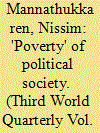| Srl | Item |
| 1 |
ID:
098397


|
|
|
|
|
| Publication |
2010.
|
| Summary/Abstract |
This article compares the development experiences of two societies - Kerala (a state within India) and Cuba-both widely regarded by development experts as "success stories" in the Global South for their relatively high achievements in general quality of life and social well-being as measured by UN Development Program's indicators of human development. The author argues that the lessons offered by Kerala and Cuba in rapidly alleviating endemic deprivations and enhancing human development are of enormous significance for developing countries. Indeed their experience is of particular relevance in the context of the structural adjustment programs imposed on southern countries by the Bretton Woods institutions and in the wake of the clear failures of alternative models to reduce hunger and deprivation. Examining the historical trajectory of these two "models" and the transformative practice that produced relatively high human development outcomes, the article identifies some common elements behind their success, highlighting the centrality of public action and organized democratic participation. It also examines some of the major challenges Kerala and Cuba face in the aftermath of globalization and market reforms. Although they have been successful in achieving higher economic growth, Kerala and Cuba now confront problems created by privatization, increasing inequality, and eroding public services that threaten their development models. While the two societies are facing these challenges in different ways and are still sustaining their basic social welfare programs, their experience in meeting these challenges is important for the developing world facing similar challenges.
|
|
|
|
|
|
|
|
|
|
|
|
|
|
|
|
| 2 |
ID:
095060


|
|
|
|
|
| Publication |
2010.
|
| Summary/Abstract |
Prominent postcolonial thinker Partha Chatterjee's concept of political society is an important one in understanding the vast domain of politics in the 'Third World' which falls outside hegemonic Western notions of the state and civil society. This domain, which is often marked by the stamp of illegality, nevertheless contributes to the immense democratic churning that characterises much of the 'Third World'. However, this paper argues that the series of binaries set up by Chatterjee, like modernity/democracy, civil society/political society and the privileging of the latter half of the binary is ultimately counterproductive to the goal of democratisation. Based on empirical research on the People's Plan Campaign in Kerala, one of the most extensive democratic decentralisation programmes in the world, it will argue that the extension of popular sovereignty requires that we go beyond political society. The failures and prospects of the Plan and the struggles around it demonstrate clearly the breakdown of the binary.
|
|
|
|
|
|
|
|
|
|
|
|
|
|
|
|